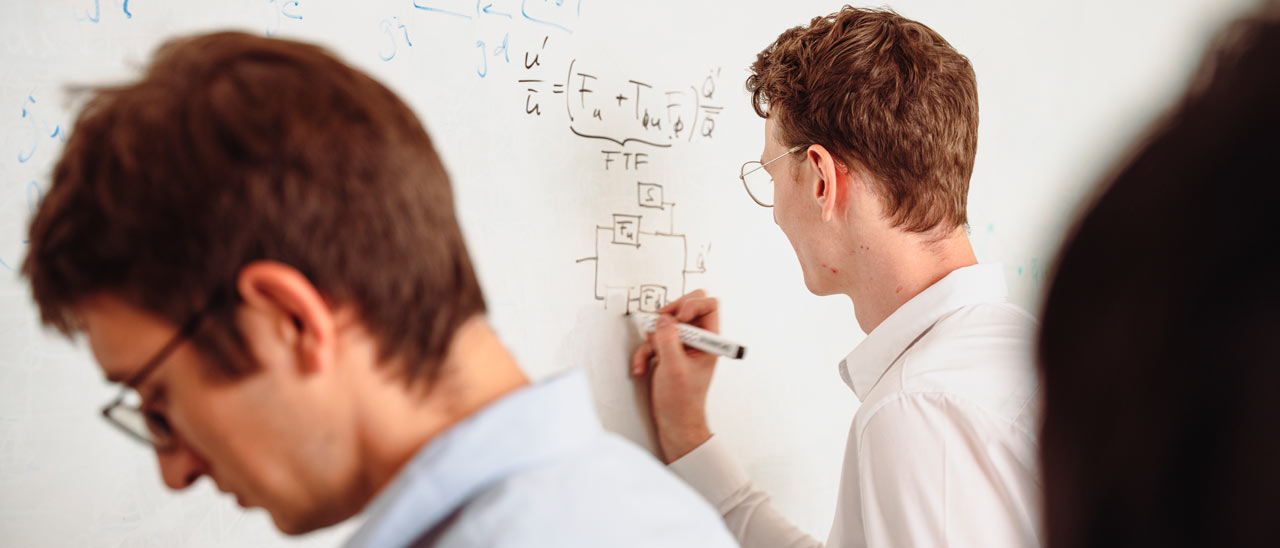Topics & Projects
The professorships of the Department of Engineering Physics and Computation conduct research on a wide variety of physical principles. On this page they present a selection of special research topics from the department. Further research projects are presented by the professorships on their websites.
VAMOR
Vibro-Acoustic Model Order Reduction
VAMOR contributes to a more sustainable and quieter future in Europe. Noise pollution is a major factor affecting quality of life. Noise reduction measures often lead to increased mass and/or volume, compromising sustainability, e.g., with heavier vehicles. To achieve more sustainable and acoustically optimal products, vibro-acoustic design must be considered in the design phase. Additionally, product sustainability can be enhanced by analyzing sound information to detect potential issues. Efficient physics-based sound modeling is crucial for creating optimized and sustainable acoustic profiles and affordable digital twins for real-time monitoring. VAMOR aims to provide doctoral candidates with advanced skills in efficient vibro-acoustic modeling to promote a quieter and more sustainable environment. The VAMOR consortium brings together leading academic institutions and industrial partners to develop new tools for simulating noise and vibration and improve the acoustic comfort of products.
Further research projects of the Chair of Vibro-Acoustics of Vehicles and Machines
Predictive computer simulation of coronary arteries
Towards personalised risk stratification for in-stent restenosis after angioplasty with stent implantation
The aim of this project is to employ advanced biomechanical simulations in the clinical context to address one of the main complications after treating stenotic coronary arteries using angioplasty and stent implantation: in-stent restenosis. Customized computer models derived from patient-specific medical data will be used to demonstrate the local exposure of arterial tissue to mechanical stresses before, during, and after treatment, as well as the interaction between medical devices and biological tissue. The goal is to gain new insights into the development of in-stent restenosis and to utilize this knowledge to support treatment planning for achieving the best possible outcome for patients with coronary heart disease.
Further research projects of Chair of Computational Mechanics
Crystal Grain Growth with Peridynamics
Conventional methods such as the finite element method (FEM) for solid mechanics and fluid dynamics face natural restrictions at sharp edges and when cracks and very large deformations occur. Particle methods such as Peridynamics (PD) and related approaches are meshfree methods and do not have such limitations. One prime application is Additive Manufacturing (Selective Laser Melting), where a unified approach for thermodynamics, solid mechanics and crystal grain growth and transformation can be utilized.
Further research projects of the Mechanics & High Performance Computing Group
Deep Learning Augmented Molecular Simulations
The project is developing novel techniques to advance the state-of-the-art molecular simulations with respect to prediction fidelity and computational efficiency. To this end, the project employs the multi-body potentials and surrogate models, parametrized by deep learning architectures.
Further projects of the Professorship of Multiscale Modeling of Fluid Materials
Trajectory Planning and Control of Autonomous Race Cars
The Chair of Automatic Control is working on novel concepts for trajectory planning and control of autonomous racing vehicles with a special focus on interaction awareness. In cooperation with the Institute of Automotive Technology, the overall software is developed and tested both simulatively and experimentally. In the racing series "Indy Autonomous Challenge" and "Autonomous Challenge@CES", overtaking maneuvers with speeds of up to 266 km/h have already been successfully performed.
In-situ measurement techniques for investigating the life cycle chemical and thermodynamical properties of molten salts and corrosion prevention for thermal energy storage
The development of renewable energy sources and the optimization of energy storage technologies are important research topics for sustainable development. Thermal energy storage is well-suited for storing excess energy. The research focuses on sensible heat storage, where energy is stored by increasing the temperature of a medium. When thermal energy storageis coupled with a concentrated solar power plant, heat absorbed during the day can also be used for electricity generation at night. The main goal of the research is to better understand the chemical and thermodynamic properties of molten salt thermal storage fluids throughout their lifecycle to establish corrosion prevention strategies. A comprehensive method is planned to easily, efficiently, and accurately detect key properties in thermal storage fluids, providing theoretical support and laboratory-level validation for industrial energy storage applications.
How to dampen instabilities hampering operations of cleaner gas turbines?
Clean gas turbines are part of energy transition as load-following power plants. Reducing pollutant emissions is achieved by burning leaner gas mixture, or replacing hydrocarbons by hydrogen fuel. However, in doing so, unstable physical mechanisms counteract the reduction in emissions and may also lead to structural failure of the turbine. We are tackling this challenge at the Professorship for Thermo-Fluid Dynamics using the Linearized Reactive Flow model, in collaboration with TU Berlin and the ReACH project (EuroTech) at Ecole Polytechnique, France.
Further research projects of the Professorship of Thermo-Fluid Dynamics
